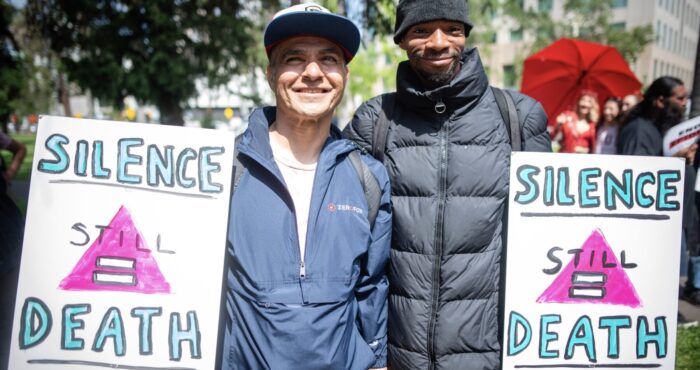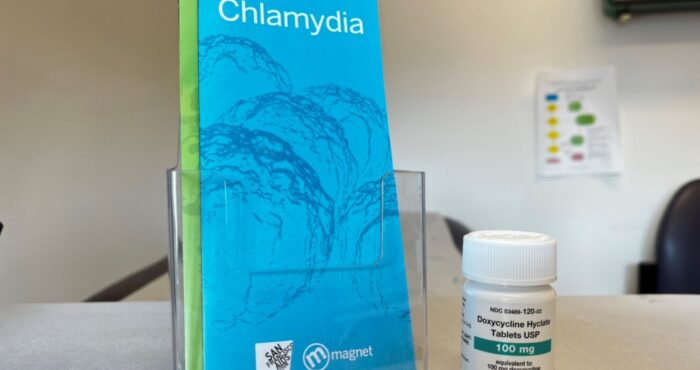Contact: Chad Ngo, cngo@sfaf.org
SAN FRANCISCO, January 25, 2022—At a critical time when the United States is experiencing its first-ever emergency blood crisis, four LGBTQ+ organizations—APLA Health, Equality California (EQCA), Los Angeles LGBT Center, and San Francisco AIDS Foundation—join California Insurance Commissioner Ricardo Lara in urging the U.S. Food and Drug Administration (FDA) to overturn a discriminatory policy maintained under the prior administration. On Monday, Commissioner Lara sent a letter urging an end to the FDA’s policy banning blood donations from gay and bisexual men. Currently the FDA requires that men who have sex with men must abstain from sex for three months before donating blood.
“This is outdated, discriminatory guidance based in prejudice – not in public health – and it is contributing to our current national blood donation crisis,” said Insurance Commissioner Ricardo Lara in his letter to FDA’s Acting Commissioner Dr. Janet Woodcock and U.S. Department of Health and Human Services Secretary Xavier Becerra. “I respectfully urge you to permanently lift the entire deferral period in order for a male donor who has had sex with another man from donating blood.”
“The FDA’s de facto ban on blood donations from gay and bisexual men is outdated, stigmatizing, and not based in science,” said APLA Health CEO Craig E. Thompson. “Leading medical groups have long argued that the agency’s policy should instead be based on a person’s individual risk regardless of sexual orientation or gender identity. With the nation now experiencing the worst blood crisis in over a decade, it’s time for the FDA to put an end to its obsolete and discriminatory policy to help ensure a safe and adequate blood supply during the pandemic.”
Research by the Williams Institute at the UCLA School of Law indicate that, if the outdated policy is lifted, up to 615,300 additional pints of blood per year—enough blood to help save the lives of more than one million people—can potentially be contributed by gay and bi men.
“It’s long past time for the FDA to adopt a policy based on science, not stigma,” said EQCA Legislative Director Tami Martin. “We’re grateful to Commissioner Lara for his continued leadership in the fight to end this outdated, discriminatory ban once and for all.”
The FDA’s original lifetime ban against gay and bi men was enacted in 1983 when little was known about the mechanisms of HIV transmission and the AIDS epidemic was concentrated primarily in the gay male community. In 2015 the lifetime ban was partially lifted after the FDA announced that men who have sex with men would be able to donate blood following a year of abstinence. In April 2020 the one-year deferral period was reduced to three months to diminish the nation’s urgent need for blood during the COVID-19 pandemic.
“San Francisco AIDS Foundation supports ending the deferral period for blood donation impacting men who have sex with men,” said Kevin Rogers, interim CEO of San Francisco AIDS Foundation. “Requiring gay, bisexual, Queer and other men who have sex with men to abstain from sex for three months in order to donate blood is an impractical and fear-based policy, rooted in stigma, that effectively prevents many possible donors from ever donating blood. With pre-exposure prophylaxis (PrEP), regular HIV testing, treatment as prevention, and other HIV prevention tools at our disposal, there are many effective ways for people to prevent HIV infection, or remain undetectable if living with HIV. We fully support screening donors on health history and risk behavior rather than identity and sexual orientation.”
“We applaud Commissioner Lara for his leadership on this issue. The current ban, even with its recent revisions, is a remnant of the homophobia and ignorance that was propagated by politicians and bigots early in the AIDS pandemic,” said Los Angeles LGBT Center Executive Director Joe Hollendoner. “It specifically discriminates against gay men. A heterosexual person could have hundreds of partners within a three-month period and still be allowed to donate blood but if a gay man has sex just once during that same period, he would be automatically denied. The ban is bad public health policy while ignoring recent advancements in HIV care and discounting the science established by other countries that have no such ban. What’s worse, it flies in the face of the critical need for blood donation in the midst of health emergencies like the one we now face.”
The United Kingdom announced in May 2021 that donors will no longer be asked if they are a man who has had sex with another man. Potential blood donors—regardless of their gender—will be asked, instead, of their most recent sexual activities. This year France and Greece announced their plans to abolish their longtime restrictions on blood donations from gay and bi men.
“At the beginning of the COVID-19 pandemic, I was denied the ability to donate plasma because I am Queer,” said Russell Roybal, Chief Advancement Officer of San Francisco AIDS Foundation. “As a person who had contracted COVID-19 very early on, I knew donating my plasma could have helped researchers just beginning to study vaccines and treatments yet was screened out of the process which required a 12-month deferral for men who have sex with men. Even with the shortened three-month deferral, it still sends the message that our blood is dangerous and worthless, which only serves to promote stigma and shame.”
###
About San Francisco AIDS Foundation
San Francisco AIDS Foundation promotes health, wellness, and social justice for communities most impacted by HIV, through sexual health and substance use services, advocacy, and community partnerships. Founded in 1982, SFAF envisions a future where health justice is achieved for all people living with or at risk for HIV, ultimately striving for a day when race is not a barrier to health and wellness, substance use is not stigmatized, HIV status does not determine quality of life, and HIV transmission is eliminated. Each year more than 25,000 people rely on SFAF programs and services and millions more find advocacy tools and information they need online at sfaf.org.








